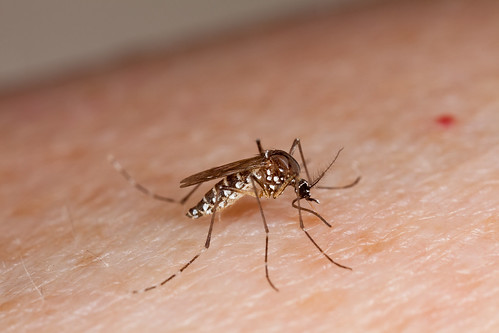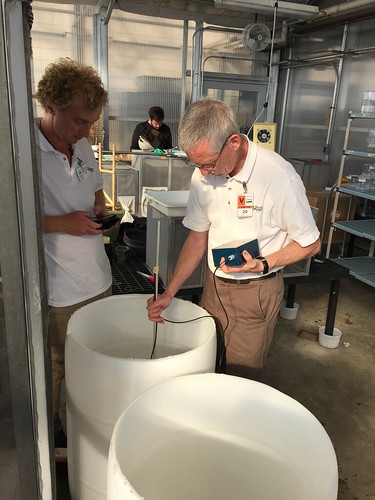
Think it’s safe to go outside without mosquitoes bothering you? Think again! Labor Day is over, but mosquitoes are still buzzing around, waiting for their next prey. This blood-feeding pest is more than annoying, since some mosquitoes can transmit viruses that can cause diseases such as Zika.
According to the U.S. Centers for Disease Control and Prevention, more than 5,300 Zika virus disease cases have been reported in the United States and nearly 37,000 cases in U.S. territories since 2015.
Agricultural Research Service (ARS) scientists are testing innovative ways to reduce mosquito populations around residences. ARS research entomologist Seth Britch and his colleagues in Gainesville, Florida, tested a new technology, developed by private industry, that uses intense sound waves to kill mosquito larvae in water. This technology, a portable acoustic device, targets two major species—the Asian tiger mosquito, Aedes albopictus, and the yellow fever mosquito, Aedes aegypti—which can transmit viruses to humans that may cause Zika, dengue fever, chikungunya, yellow fever and other diseases.
“The device was highly effective at killing yellow fever mosquito larvae in large plastic containers of water, similar to those found in developing countries where this species is prevalent,” Britch says.
Traditionally, larvicides (synthesized or natural-based chemicals) are used to control mosquito larvae. This may not be practical for people in developing nations who store drinking water in containers in and around houses. Yet, untreated containers harboring mosquito larvae pose a persistent public health threat.
“The new sound wave technology works and can be used in 50-gallon plastic drums of drinking water with no danger to humans,” Britch says.
ARS scientists develop novel methods for surveying, controlling and protecting people from nuisance mosquitoes and those that transmit dangerous pathogens, says Kenneth Linthicum, director of the ARS Center for Medical, Agricultural, and Veterinary Entomology. Research includes effective repellents, technologies to prevent mosquito reproduction, novel baits to lure and kill mosquitoes, and natural products to deter them.
While summer has officially ended, mosquitoes may hang around a bit longer—as long as temperatures hover around 60 degrees.
What can you do to protect yourself against mosquitoes when outside? Linthicum suggests wearing mosquito repellent and clothing that minimizes exposed skin and draining all standing water in containers, including flower pots, near your house. In addition, you can have a pest control company spray to help keep bugs and mosquitoes away.
Watch our YouTube video to learn about other ARS mosquito research efforts.



